Physio Hub/ Bending
22/04/22 - 3 min read
Is it Bad to Bend?

You have probably always been told “lift with your legs not your back.” Now while this is an absolutely fine way to go about lifting heavy objects in the easiest way possible, does that mean that we should be lifting EVERYTHING with our legs for fear of damaging our back?
 The research that propagated this notion that spinal flexion causes structural damage like disc herniations etc. was carried out on pig spines and human cadavers. It is easy to forget that bone, nerves, muscle etc, are all LIVING tissues, constantly adapting to any stresses placed on them. This research unfortunately ignores the body's ability to adapt to mechanical stimuli placed on it so is hardly representative of your own back (unless you are a dead pig!).
The research that propagated this notion that spinal flexion causes structural damage like disc herniations etc. was carried out on pig spines and human cadavers. It is easy to forget that bone, nerves, muscle etc, are all LIVING tissues, constantly adapting to any stresses placed on them. This research unfortunately ignores the body's ability to adapt to mechanical stimuli placed on it so is hardly representative of your own back (unless you are a dead pig!).
Your back is not as fragile as you think. Bending forward at the hips to pick up an object includes your hamstring and glutes to assist your low back in the lift, this is called a hip hinge or a deadlift (technically still lifting with our legs, but also developing strong back muscles!). The world record for the deadlift currently stands at around 500kg, half a tonne, performed by Eddie Hall (below). Now while this is the extreme end of things it demonstrates that, with practice and the right coaching, our backs and spines can adapt and get incredibly strong without any fear of pain or snapping in half! You mightn’t need to train to the point that Eddie Hall did, but if it is your goal to have enough strength in your back to garden, paint or dance pain free then it is very attainable. If you are afraid of moving your back keep in mind that prolonged sitting in a slouched position can place nearly as much pressure on discs as deadlifting in a far more deleterious way as you don’t get muscle or bone strengthening from sitting down, you get the opposite, so why not give the hip hinge a go.
So if you are struggling with back pain or avoiding using your back, it might be time to talk to your physio about getting your spine moving. Call PhysioHub on 01 5253440 or book online at www.physiohub.ie.